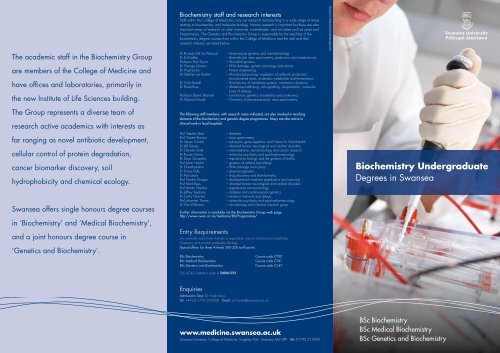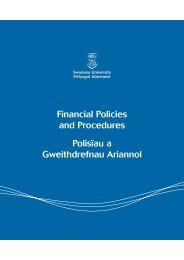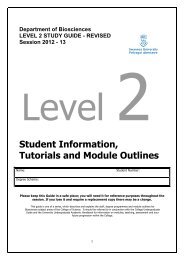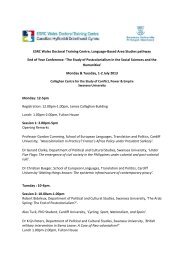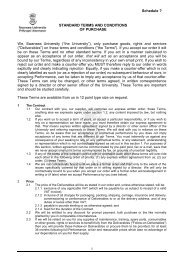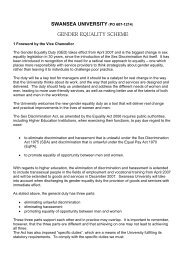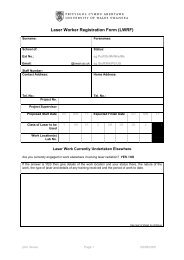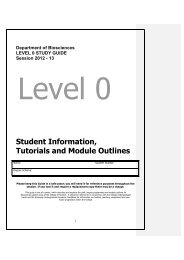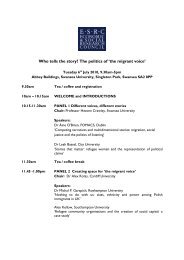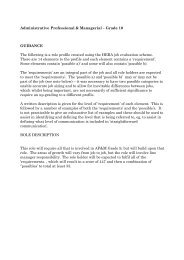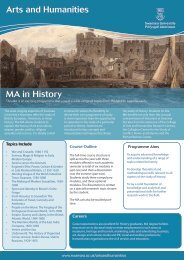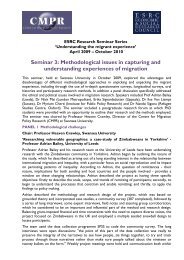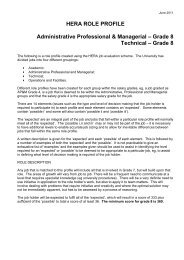BSc Biochemistry Programmes e-brochure - Swansea University
BSc Biochemistry Programmes e-brochure - Swansea University
BSc Biochemistry Programmes e-brochure - Swansea University
You also want an ePaper? Increase the reach of your titles
YUMPU automatically turns print PDFs into web optimized ePapers that Google loves.
The academic staff in the <strong>Biochemistry</strong> Group<br />
are members of the College of Medicine and<br />
have offices and laboratories, primarily in<br />
the new Institute of Life Sciences building.<br />
<strong>Biochemistry</strong> staff and research interests<br />
Staff within the College of Medicine carry out research and teaching in a wide range of areas<br />
relating to biochemistry and molecular biology. Human research is important but there are also<br />
important areas of research on other mammals, invertebrates, and microbes such as yeast and<br />
Streptomyces. The Genetics and <strong>Biochemistry</strong> Group is responsible for the teaching of the<br />
biochemistry degree courses from within the College of Medicine and the staff and their<br />
research interests are listed below:<br />
Dr Ricardo Del Sol Abascal<br />
Dr Ed Dudley<br />
Professor Paul Dyson<br />
Dr George Johnson<br />
Dr Hugh Jones<br />
Dr Geertje van Keulen<br />
Dr Colin Restall<br />
Dr Paula Row<br />
Professor David Skibinski<br />
Dr Masood Yousef<br />
– Streptomyces genetics and nanotechnology<br />
– Biomolecular mass spectrometry, proteomics and metabolomics<br />
– Microbial genetics<br />
– DNA damage, genetic toxicology and cancer<br />
– Protein engineering<br />
– Microbial physiology, regulation of antibiotic production,<br />
environmental stress, anaerobic metabolism and fermentation<br />
– <strong>Biochemistry</strong> of membrane systems, membrane dynamics<br />
– Membrane trafficking, cell signalling, ubiquitination, molecular<br />
basis of disease<br />
– Evolutionary genetics, biostatistics and proteomics<br />
– Chemistry of pharmaceuticals, mass spectrometry<br />
Designed by www.iconcreativedesign.com<br />
The Group represents a diverse team of<br />
research active academics with interests as<br />
far ranging as novel antibiotic development,<br />
cellular control of protein degradation,<br />
cancer biomarker discovery, soil<br />
hydrophobicity and chemical ecology.<br />
<strong>Swansea</strong> offers single honours degree courses<br />
in ‘<strong>Biochemistry</strong>’ and ‘Medical <strong>Biochemistry</strong>’,<br />
and a joint honours degree course in<br />
‘Genetics and <strong>Biochemistry</strong>’.<br />
The following staff members, with research areas indicated, are also involved in teaching<br />
elements of the biochemistry and genetics degree programmes. Many are also active in<br />
clinical work in local hospitals.<br />
Prof Stephen Bain<br />
Prof Gareth Brenton<br />
Dr Steven Conlan<br />
Dr Jeff Davies<br />
Dr Shareen Doak<br />
Dr Rossen Donev<br />
Dr Deya Gonzalez<br />
Prof Julian Hopkin<br />
Dr Gareth Jenkins<br />
Dr Diane Kelly<br />
Dr Paul Lewis<br />
Prof Gareth Morgan<br />
Prof Mark Rees<br />
Prof Martin Sheldon<br />
Dr Jeffrey Stephens<br />
Dr Cathy Thornton<br />
Prof Johannes Thome<br />
Dr Tom Wilkinson<br />
– diabetes<br />
– mass spectrometry<br />
– eukaryotic gene regulation and Centre for NanoHealth<br />
– inherited human neurological and cardiac disorders<br />
– nanomedicine, nanotoxicology and cancer research<br />
– molecular psychiatry and psychopharmacology<br />
– reproductive biology and the genetics of fertility<br />
– genetics of asthma and allergy<br />
– DNA damage and cancer<br />
– pharmacogenetics<br />
– drug discovery and bioinformatics<br />
– developmental medicine (paediatrics and immunity)<br />
– inherited human neurological and cardiac disorders<br />
– reproductive immuno-biology<br />
– diabetes and cardiovascular genetics<br />
– newborn immunity and allergy<br />
– molecular psychiatry and psychopharmacology<br />
– microbiology and infection research group<br />
Further information is available via the <strong>Biochemistry</strong> Group web page.<br />
http://www.swan.ac.uk/medicine/<strong>BSc</strong><strong>Programmes</strong>/<br />
Entry Requirements<br />
You normally need three A-levels or equivalent, one of which must normally be<br />
Chemistry and another preferably Biology.<br />
Typical offers: for three A-levels 300-320 tariff points.<br />
<strong>BSc</strong> <strong>Biochemistry</strong><br />
<strong>BSc</strong> Medical <strong>Biochemistry</strong><br />
<strong>BSc</strong> Genetics and <strong>Biochemistry</strong><br />
The UCAS institution code is SWAN S93<br />
Course code C700<br />
Course code C741<br />
Course code CC47<br />
<strong>Biochemistry</strong> Undergraduate<br />
Degrees in <strong>Swansea</strong><br />
Enquiries<br />
Admissions Tutor: Dr Hugh Jones<br />
Tel: +44 (0) 1792 295668 Email: d.h.jones@swansea.ac.uk<br />
www.medicine.swansea.ac.uk<br />
<strong>Swansea</strong> <strong>University</strong>, College of Medicine, Singleton Park, <strong>Swansea</strong> SA2 8PP Tel: 01792 513400<br />
<strong>BSc</strong> <strong>Biochemistry</strong><br />
<strong>BSc</strong> Medical <strong>Biochemistry</strong><br />
<strong>BSc</strong> Genetics and <strong>Biochemistry</strong>
Opportunities in <strong>Biochemistry</strong><br />
General Information on <strong>Biochemistry</strong> Degree Courses<br />
Our Teaching Scheme<br />
<strong>Biochemistry</strong> represents the understanding of cellular processes at the chemical level, allowing<br />
for an understanding of the biochemical processes and interactions that are present in healthy<br />
and diseased states. <strong>Biochemistry</strong> includes the study and treatment of a huge variety of human<br />
diseases, the development of pharmaceuticals, the understanding of cellular control mechanisms<br />
and the complex interactions between microbes, our environment and us. Furthermore,<br />
<strong>Biochemistry</strong> has been at the forefront of biomedical developments advancing our<br />
understanding of diseases at the molecular level and the development of novel treatments.<br />
The degree schemes utilise College of<br />
Medicine research facilities, which include<br />
the Biomolecular Analysis Mass Spectrometry<br />
(BAMS) laboratories which allow<br />
post-genomic studies such as functional<br />
proteomics and metabolomics.<br />
• The <strong>Biochemistry</strong> degree in <strong>Swansea</strong> has<br />
been formulated to benefit from research<br />
strengths in molecular cell biology,<br />
microbiology, biomolecular mass<br />
spectrometry and environmental science.<br />
• The <strong>Biochemistry</strong> degree also provides<br />
a detailed knowledge at the chemical<br />
and molecular level, of the structure and<br />
function of living organisms, from bacteria<br />
to plants and animals.<br />
• Medical <strong>Biochemistry</strong> involves further<br />
teaching input from the medical<br />
professionals within the College of<br />
Medicine, many of whom work as doctors<br />
and consultants in local hospitals.<br />
Students graduating in <strong>Biochemistry</strong> find<br />
a variety of positions open to them following<br />
graduation, including positions in<br />
pharmaceutical companies, hospital<br />
laboratories and academia; some undertake<br />
careers in fields as diverse as teaching,<br />
scientific publication management, forensic<br />
science and scientific sales. We offer expert<br />
careers advice throughout the course itself<br />
and also to our graduates. Although most of<br />
our graduates find careers that are closely<br />
allied to their degree subjects, they also learn<br />
a vast array of transferable skills that are<br />
applicable to most career options; this<br />
provides them with access to a diverse range<br />
of potential career choices after their degree.<br />
The Medical <strong>Biochemistry</strong> course provides<br />
appropriate training for students wishing to<br />
train as medical doctors. Although we cannot<br />
guarantee placement on graduate entry<br />
medical programmes following graduation<br />
with a genetics or biochemistry degree, we<br />
can provide appropriate help and guidance.<br />
“The biochemistry research project was a great opportunity to<br />
further myself, allowing me to not only learn about the intricacies of<br />
biochemistry but also preparing me for a future career in science and<br />
research. The academic staff are always approachable and helpful.”<br />
Alun Newsome<br />
Third year Medical <strong>Biochemistry</strong> undergraduate<br />
The home department of the students pursuing biochemistry degrees is the College of Medicine.<br />
At all levels (years), teaching is carried out under the modular system. Each module is concerned<br />
with a specific topic and usually carries 10 credits. Students follow modules giving a total of<br />
120 credits at each level. Most modules consist of about 15 lectures and associated practical<br />
classes given over a period of 5 weeks. Students will normally complete one or more marked<br />
assignments such as practical write-ups for each module and undertake a written exam. There is<br />
some flexibility for students to change degree scheme during Levels 1 or 2.<br />
At each level students have both personal and academic tutors who monitor their progress and<br />
are available to discuss both academic and any other problems that they may have.<br />
An important module at each level is the <strong>Biochemistry</strong> tutorial module which is undertaken in<br />
small groups, allowing for significant contact time between students and academics. In this<br />
module, the student develops a vast array of transferable skills. They are introduced to the<br />
scientific literature and receive guidance in essay writing, analysis of scientific problems,<br />
preparing presentations, giving feedback to peers and participating in scientific discussion<br />
and debate in small groups under the supervision of members of staff.<br />
Research Project<br />
A key component at Level 3 is the research<br />
project (30 credits) in which students carry<br />
out research in a laboratory in the College of<br />
Medicine on a novel problem at the frontiers<br />
of scientific research. Project students have the<br />
opportunity to work in research laboratories<br />
equipped to the highest standards. Facilities<br />
include a range of;<br />
• Bioanalytical equipment such as HPLC,<br />
GC and Mass spectrometry<br />
• DNA and protein analytical equipment,<br />
• Computer based image analyzers for<br />
molecular or cellular studies, and<br />
• A powerful supercomputer facility.<br />
Project topics are offered from the contributing<br />
staff as listed on the back page of this<br />
pamphlet. There is the opportunity for<br />
hands on experience of techniques such as<br />
• ELISA protein visualisation and<br />
quantitation analysis,<br />
• Proteomics,<br />
• Bioanalytical chemistry and separation<br />
sciences,<br />
• fluorescence microscopy, and<br />
• analysis of antibiotic production by<br />
bacteria and other organisms<br />
For Medical <strong>Biochemistry</strong> students, project<br />
topics include a wide range of medical<br />
areas, including cancer research and the<br />
identification of the genes involved in<br />
diseases such as diabetes and asthma.<br />
Students benefit from the opportunity to attend<br />
research talks which are held at least weekly.<br />
These are given by <strong>Swansea</strong> staff or by<br />
speakers from other universities or research<br />
institutes. There are some opportunities for<br />
taking time out for spending periods of<br />
research in industrial or medical laboratories<br />
either in the UK or abroad.<br />
Teaching in Level 1 (Year 1)<br />
In the first year students pursue a broad range of modules across the whole range of biology<br />
and chemistry, including biochemistry. Further study of biochemistry and medical biochemistry<br />
topics takes place in the tutorial module.<br />
Teaching in Level 2 (Year 2)<br />
In the second year, students take specialised modules in biochemistry given by the College of<br />
Medicine which are wide-ranging but focus on biochemical techniques that can be used in<br />
scientific investigation, metabolic pathways involved in the biochemical conversions of sugars<br />
and fatty acids, biomolecular mass spectrometry (including protein analysis), enzymology<br />
and its role in metabolic regulation and clinical biochemistry.<br />
Teaching in Level 3 (Year 3)<br />
In the final year, the modules allow students to pursue specialised topics in greater depth.<br />
Many of the topics are related to the research strengths of the academic staff.<br />
Students studying for a <strong>Biochemistry</strong> degree (C700) would normally follow modules covering the<br />
areas of recombinant DNA technology, biotechnology and protein engineering, membranes and<br />
energy transduction pathways and nucleic acid metabolism / chemical modification. Students also<br />
undertake a 30-credit project module in an appropriate area of biochemistry.<br />
Students studying for a Medical <strong>Biochemistry</strong> degree (C741) would normally follow modules<br />
including aspects of sensory and metabolic biochemistry, the biochemistry of natural products,<br />
mutations and human health, medical genetics, membrane trafficking of proteins and carry out<br />
a 30-credit project in an area of medical biochemistry.<br />
Students in both <strong>Biochemistry</strong> and Medical <strong>Biochemistry</strong> would have the possibility of<br />
pursuing some optional modules according to interest, for example in molecular evolution,<br />
cell physiology / immunobiology and genetics of cancer.


